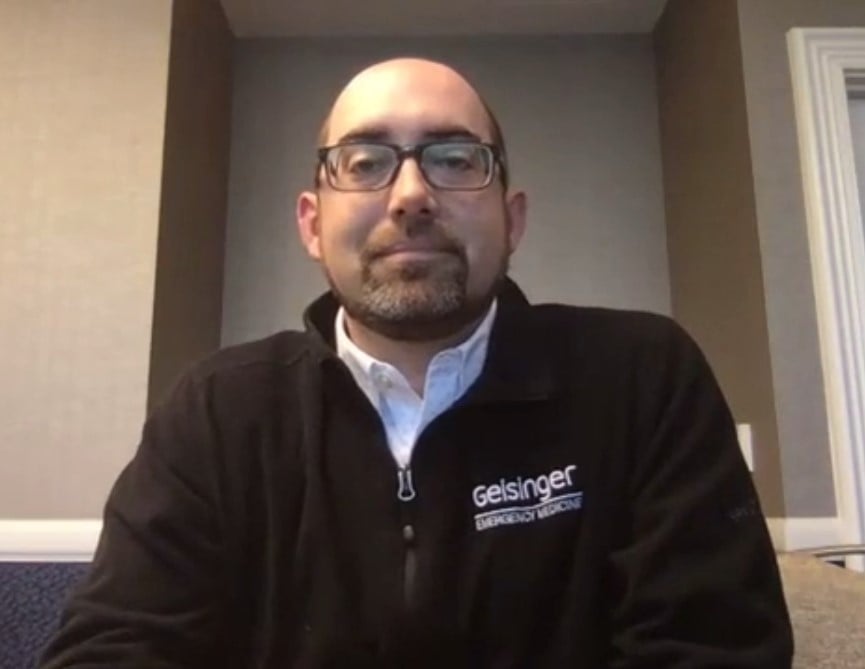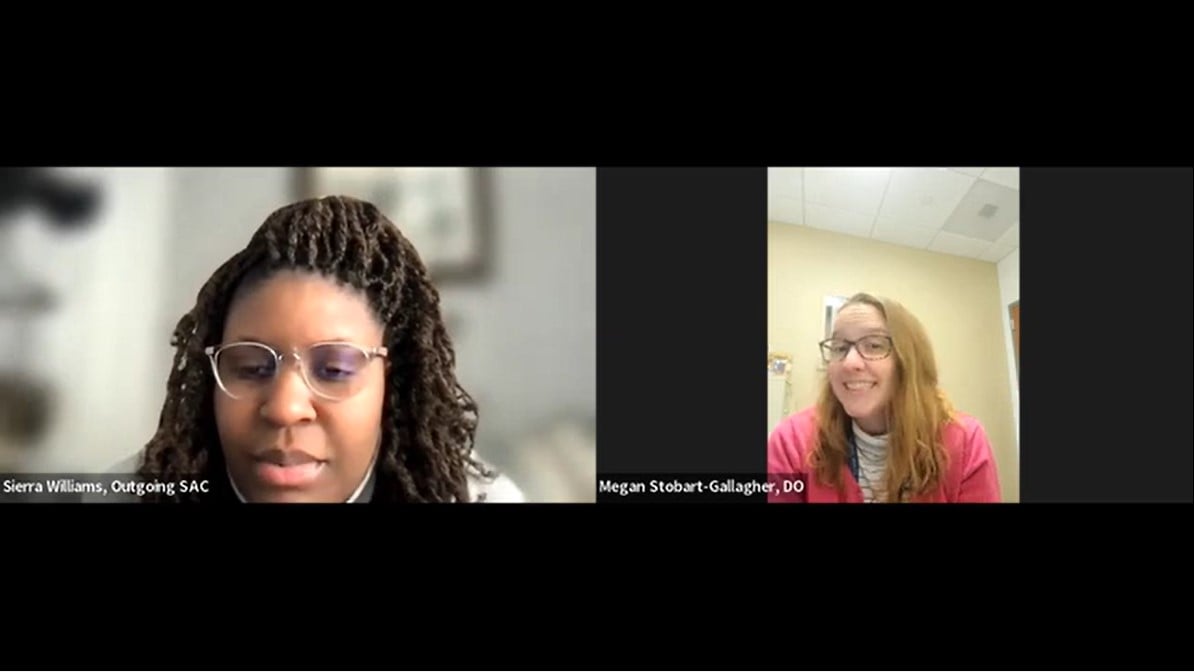Program Director Interview Series: David Della-Giustina, MD, FACEP, FAWM COL(Ret), US Army, Yale School of Medicine
Ivana Baldie, MS-IV
SUNY Downstate College of Medicine
EMRA MSC Northeast Regional Representative
- What sets your program apart from others?
There are several things that truly set our program apart. First and foremost, Yale Emergency Medicine offers the full spectrum of emergency medicine training all within one hospital. Our residents don’t need to rotate through multiple hospitals to gain essential experiences because it’s all right here at Yale-New Haven Hospital. Within our hospital you see the entire spectrum emergency care all without having to travel elsewhere. That said, we do incorporate rotations at Bridgeport Hospital to ensure exposure to a strong community general and pediatric emergency medicine experience. But the core of our training happens in a high-volume, high-acuity, tertiary care center that serves as a major regional receiving facility. We care for a lot of critically ill patients. In our main ED, which sees almost 100,000 patients, we admit over 38% of patients, with more than 8,000 patients each year going either to the ICU or OR. Because of this acuity, our residents perform procedures at a rate three to four times higher than the minimum numbers recommended by ABEM, giving them extraordinary hands-on experience and procedural confidence. We are also proud to be the top-funded emergency medicine department for research in the country, a distinction we've held for several years. And it's not just one research niche. We have nationally recognized strengths across multiple areas, including addiction medicine, quality and EM Administration, geriatrics, informatics, social emergency medicine, and more. Our residents benefit from an exceptional simulation curriculum, with a dedicated two-week sim rotation each year, supported by a state-of-the-art simulation center. Most importantly, our faculty are outstanding. We have nationally and internationally recognized leaders in nearly every subspecialty of emergency medicine, even including wilderness medicine. Many of the faculty are the ones writing the textbook chapters and leading the studies that shape our field, so our residents are truly learning from the best. - What are the benefits of attending a 3- vs. 4-year EM residency program?
There are significant advantages to attending a four-year emergency medicine residency program, and we believe the added value is substantial. The most important benefit is the opportunity for more clinical experience in a deliberate practice environment. That fourth year gives residents approximately 1,100 additional hours of hands-on patient care, working directly under the supervision of emergency medicine attendings. This extended, mentored clinical exposure allows residents to receive detailed, real-time feedback on their decision-making, procedures, and care for critically ill and injured patients which ultimately accelerates their development into confident, highly capable emergency physicians. In addition to clinical time, residents in a four-year program also receive four additional 28-day blocks of elective time. This is incredibly valuable for pursuing areas of personal interest, addressing gaps in knowledge or experience, or preparing for future fellowship or job opportunities. That extra year gives residents the time and flexibility to explore different facets of emergency medicine and to make more informed decisions about their future career path,whether academic, clinical, fellowship-based, or otherwise. - What is something students may not know about your program?
What many students don’t realize is that New Haven is an incredible place to live and train, and importantly, yes, it’s also the pizza capital of the country. Our city is home to some of the most legendary pizzerias in the U.S., including Sally’s, Pepe’s, and Modern, and locals and visitors alike are deeply passionate about the ongoing pizza debates. But great food is just the beginning. New Haven is a vibrant, walkable city with a rich academic, cultural, and social scene. Within a five-mile radius, there are five colleges and universities, which creates a diverse and intellectually energetic environment. The city offers a wide range of restaurants, cafes, live music venues, and theaters—many of which are nationally recognized—all within a short distance from the hospital. The cost of living is lower than many other major academic centers, and residents often find affordable housing in great neighborhoods—whether they want to live downtown or in a quieter spot near green space. The city is bike- and pedestrian-friendly. Access to nature is another major plus. Within a few miles of downtown, you can find hiking trails, kayaking, climbing, and other outdoor activities. Whether you're spending an afternoon at East Rock Park or taking a coastal walk along Long Island Sound, the balance of city and nature is ideal for recharging on days off. And if you’re craving big-city energy, New York City and Boston are both easily accessible by train, making weekend getaways simple. New Haven offers a unique blend of academic richness, outdoor access, cultural diversity, and affordability—all of which create a fantastic lifestyle and training environment for emergency medicine residents. - What range of USMLE/COMLEX Step/Level 2 scores do you look for in an applicant for the program? Or alternatively, how do you feel about the change to pass/fail Step 1 grading?
We do not use a specific score threshold or cutoff when considering applicants for our program. In fact, we have interviewed, and even accepted, applicants who have failed either Step 1 or Step 2. While higher board scores are certainly preferred and can reflect academic preparation, they are not a significant differentiator in our selection process. We believe that performance on a multiple-choice exam is only one small piece of a much larger picture. At Yale, we focus much more on the overall fit of an applicant: their clinical abilities, professionalism, communication skills, resilience, and alignment with our program’s values and culture. The transition to pass/fail Step 1 hasn’t significantly changed how we evaluate candidates, we’ve always looked beyond the numbers. - What kinds of research opportunities exist? Do you look for residency candidates with research experience?
Yale is an exceptional place to pursue research,especially for those interested in academic or physician-scientist careers in emergency medicine. We offer a dedicated research pathway called the Yale Emergency Scholars (YES) Program, a combined emergency medicine residency and research fellowship specifically designed for residents committed to becoming future researchers and academic leaders in EM. The YES Program accepts two residents per year out of 19 in each class. During the first two years of training, YES residents follow the same curriculum as their peers, with additional early mentorship from our research faculty. In the third and fourth years, elective time is spread across the academic year to support focused research development, including protocol design, grant writing, and scholarly output. After graduation, YES participants remain at Yale for a fifth year as research fellows. The YES residents also have opportunities to pursue a master’s degree or take additional university coursework. For the traditional residents, the emphasis of training remains on becoming exceptional clinical emergency physicians. However, all residents are expected to participate in a research or scholarly project of publishable quality. These projects may be done individually or as part of a team, and residents are well supported by faculty mentors to ensure success. The goal is to foster scholarly thinking and engagement, even for those pursuing careers in community practice or non-research-focused fellowships. While prior research experience can be beneficial for those applying to the YES Program, it is not required for general applicants, and it is not a major focus of our selection process. We welcome candidates with a variety of interests and goals. 6. Does your institution offer opportunities to explore global health? Yes, our program offers meaningful and well-supported opportunities in global health. Through the Yale Global Health Program for Residents, we offer fully funded six-week international rotations for up to five residents each year. These rotations take place at one of five established global partner sites and are typically completed during elective time in the third or fourth year of residency. Residents participating in global health rotations continue to receive full salary support, and we actively encourage their involvement in these experiences. In addition to clinical work abroad, residents can also engage in global health research and collaborate on international education or systems development projects. Our department offers a Global Health Fellowship, which strengthens international partnerships and creates additional opportunities for mentorship, research, and future global work. This infrastructure helps make global health a truly accessible and integrated part of residency training for those who are interested. - What qualities does your program look for in applicants?
We are looking for kind, compassionate, and collaborative individuals who are not only committed to excellence in emergency medicine, but also to being outstanding teammates and contributors to the broader healthcare community. We value applicants who are self-starters and those who have gone above and beyond to demonstrate their dedication, initiative, and motivation to grow both personally and professionally. We are also looking for leaders and future leaders. Our program offers numerous opportunities for residents to engage in leadership at the local, regional, and national levels. We want residents who are excited to step into those roles, take advantage of the opportunities we offer, and ultimately help shape the future of emergency medicine. Given the breadth and depth of resources in our department, we also look for applicants who are eager to develop expertise in a focused area, whether that's medical education, wilderness medicine, global health, EMS, health policy, research, simulation, ultrasound, or another subspecialty. Our ideal resident is someone who brings both a collaborative spirit and a clear sense of purpose,someone who wants to grow, lead, and contribute to our community. - What attributes or experiences make applicants stand out?
As mentioned earlier, we are especially drawn to applicants who are kind, compassionate, and grounded in a strong sense of teamwork. What really makes a candidate stand out is someone who has not only embraced those values, but also demonstrated leadership,either through service, advocacy, education, innovation, or any other meaningful endeavor,before or during medical school. Ultimately, what distinguishes an applicant isn’t just a long list of accomplishments, but how they’ve grown through those experiences, how they’ve treated others along the way, and how they will contribute to our residency community,as a clinician, as a teammate, and as a future leader in emergency medicine.
Related Content







